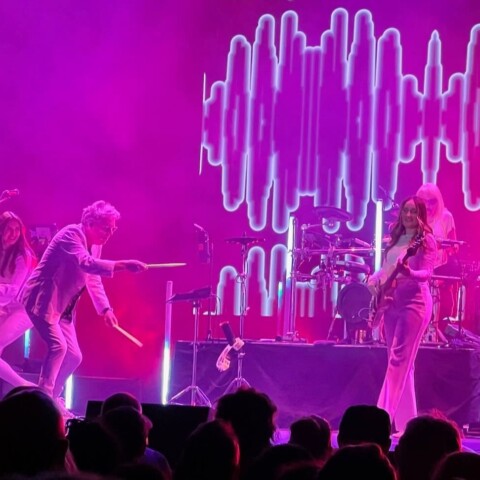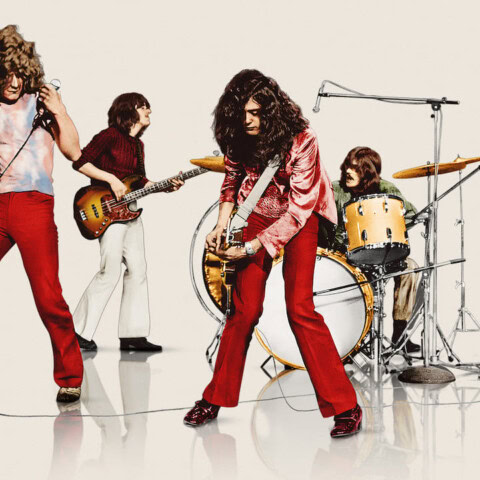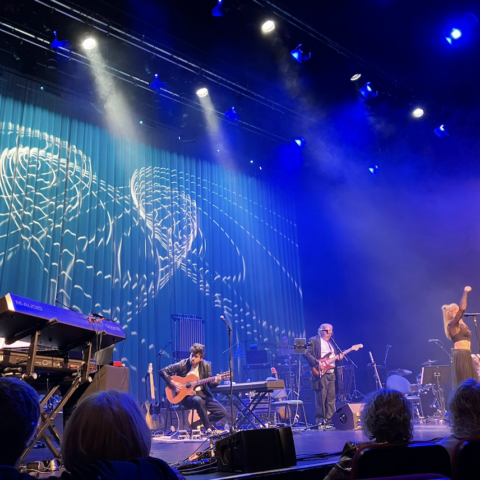MY REVELATION AT tonight’s Yes concert actually came afterwards. I had moderately enjoyed the gig, to a point, but had a nagging feeling that things hadn’t been quite right. After dropping off my concert companion, my dear old friend Steve (who, I should point out, adored certain sections of the performance), and heading out on the long drive to my semi-rural idyll, it occurred to me to slam Fragile into the car’s CD player. Big mistake! Fantastic! Instantly, it put the performance I had witnessed just half an hour before in the shade, rendering it redundant. The album isn’t flawless, or perfect, but it’s “on duty”. The reformed Yes, tonight at the ASB Theatre, just weren’t “on duty”, weren’t quite right.
During one of the sometimes wonderful, sometimes interminably lengthy sections in tonight’s performance I couldn’t help feel grateful that I had chosen the writing profession, rather than that of a musician. Writers can just be hitting their stride at 80 years old. Musicians, on the other hand, invariably pack all their creativity into a period of 10 years (or more often, much less), after which they are doomed to recreate their classic hits for new generations of fans (or old fans who just want to relive the glory). This odd anomaly means that bands like Yes inevitably become obscene caricatures of themselves, touring the world creating karaoke-style abominations of their classic works.
Speaking of classic works, I’m old enough to remember the reception Close To The Edge got when it came out in 1972, and how reviewers who probably should have known better acclaimed it as a genuine heir to the classical music tradition. That record – recently voted the best progressive rock album of all time by Progressive magazine readers – was played in full at the Yes gig, along with its 1971 predecessor, Fragile, and sadly, the current lineup’s attempt to render the rococo-rock delights of these 40-something-year-old albums just didn’t add up to the full quid, or very much at all.
To be fair, this was the first gig of Yes’s current tour, so it could be seen as a warm-up, but even given possible first-night jitters there was just something off about this performance. Sure, sections and transpositions of Close To The Edge require pinpoint accuracy and musically acrobatic flair, and there were “wow” moments, but the timing didn’t sound quite right, and it was almost as if guitarist Steve Howe and keyboardist Geoff Downes weren’t on the same page. At times it made Howe (who can obviously play deliriously well) sound a bit like one of those hilarious YouTube “shredding” clips of appalling bogus noodling superimposed on guitar solos (see below). Or perhaps there was a monitor problem, or a sound level problem between the instruments. Whatever, it often wasn’t quite right.
The current lineup of Yes performed a perfectly good set at “half a Vector” two years ago (read my review of that here), with the only real issues being the digital-type harshness of Downes’ keyboard rig, and it had the benefit of cherry-picking from the entire Yes canon. I guess that, coming back so soon, the concept of performing two entire albums was an obvious cue to reinvigorate audience enthusiasm – certainly, a gig promoting their new album, Heaven And Earth, would have met with a giant yawn, as were the two songs from that record performed during tonight’s set. These 2014 compositions were clearly fashioned to mimic former singer/lyricist/muse Jon Anderson’s optimistic hippy approach to songwriting, but they proved a point: the spirit of Yes was intrinsic to the ‘70s, and the new material sounded like clichéd power ballad choruses without any real compositional development, just a couple of solos tacked on.
 But back to the meat of the concert. Starting the night with Close To The Edge was a mistake, because it’s complex twists and turns made it seem like the group weren’t quite up to its demands. In truth, that album’s recording was legendarily arduous, and its complicated passages were stitched together in sections in the studio. Like Emerson Lake & Palmer’s Trilogy from the same year, it was as much a product of the studio as real-time performance, and considered impossible to perform in its entirety. Which begs the question: why try? Sure, 21st century technology makes performance objectives more achievable than they were in the ‘70s, but it somehow made less sense than it does on disc.
But back to the meat of the concert. Starting the night with Close To The Edge was a mistake, because it’s complex twists and turns made it seem like the group weren’t quite up to its demands. In truth, that album’s recording was legendarily arduous, and its complicated passages were stitched together in sections in the studio. Like Emerson Lake & Palmer’s Trilogy from the same year, it was as much a product of the studio as real-time performance, and considered impossible to perform in its entirety. Which begs the question: why try? Sure, 21st century technology makes performance objectives more achievable than they were in the ‘70s, but it somehow made less sense than it does on disc.
What would have been great – and made for a valiant attempt to avoid the dead art of recreation/grave-robbing – would have been a radically altered version with completely rewritten sections rather than just lazy omissions.
Fragile worked much better, probably because it’s a much more piecemeal work and, while occasionally demanding musically, it doesn’t have the same demanding transpositional requirements. But by the time they charged into that album, my eyes were already glazing over at the boredom of those new Heaven And Earth songs, which also instantly stripped the group of any lingering magic. I did get a couple of vicarious thrills from this section, however, and they were right at the end: 1) The 10-minute ‘Heart Of The Sunrise’ makes for rifftastic fun, and includes the most haunting vocal melodies of all the group’s work and 2) The same song finally displays Chris Squire’s legendarily meaty bass loud and proud.
Which brings me to the sound. For some reason, although the sound was quite clear and the volume not oppressive, Alan White’s drums and Squire’s bass were really low in the mix, and that meant there was a sense of gutlessness. I had been looking forward to hearing the group at the ASB Theatre, which is famed for its excellent acoustics, but the reality was somewhat disappointing. Better sound, however, than 90 percent of the horrendous live experiences in Auckland.
 Another negative factor was the total lack of audience engagement until after the completion of Close To The Edge, which meant that the first 40-minutes could have been sent over Skype for all the difference. Later, Steve Howe made some pronouncements, and Jon Anderson replicant Jon Davison proved an enthusiastic frontman. It was Davison’s voice that proved the revelation tonight: every now and then, he would hit a note that would send shivers down the spine, and as a vocal technician, he was effortlessly better than Anderson. The problem, though, is that he’s so completely built in Anderson’s image, and it takes some imagination to convince yourself that he’s doing more than a clever ventriloquist’s act with Anderson’s lyrics and demeanor. It’s also plain weird to watch this young man dressed like a ‘70s, brown rice and lentils-eating, Tolkien-inspired hippie; and weirder still that he’s flanked by four old men.
Another negative factor was the total lack of audience engagement until after the completion of Close To The Edge, which meant that the first 40-minutes could have been sent over Skype for all the difference. Later, Steve Howe made some pronouncements, and Jon Anderson replicant Jon Davison proved an enthusiastic frontman. It was Davison’s voice that proved the revelation tonight: every now and then, he would hit a note that would send shivers down the spine, and as a vocal technician, he was effortlessly better than Anderson. The problem, though, is that he’s so completely built in Anderson’s image, and it takes some imagination to convince yourself that he’s doing more than a clever ventriloquist’s act with Anderson’s lyrics and demeanor. It’s also plain weird to watch this young man dressed like a ‘70s, brown rice and lentils-eating, Tolkien-inspired hippie; and weirder still that he’s flanked by four old men.
Okay then, at the risk of death threats, let’s talk a little about age. Steve Howe, Chris Squire, Alan White and Geoff Downes are all in their mid-to-late 60s, and unlike (for instance) the similarly aged Crosby Stills & Nash, they still have their instrumental faculties. Howe, in particular, is still capable of startling displays of fretboard dexterity, and Downes, while no-frills and workmanlike compared to Wakeman or Moraz, ably holds down the essentials. But they look terrible. It’s true that progressive rock fans aren’t looking for youthful Adonis-style rock stars, but Yes (as Rick Wakeman explained to me here) was founded by a bunch of macrobiotic vegetarians, and look at them now! With his thin wisps of long white hair and skeletal frame, Howe wouldn’t look out of place on the set of The Walking Dead, while Squire props his bass up on a belly that’s more pork than sprouts. Downes is the most flagrant fatty, however: performing with his back to us to grapple with the three-sided monster of his keyboard array, every now and then he’d turn full-frontal with a flourish, his tummy a bouncing castle. I’m not anti-fat, and yes, it should be about the music, but I couldn’t help but be somewhat aghast that this parade of almost Victorian sideshow dimensions, just as I was at Wakeman’s solo show last year. The difference, I guess, is that Wakeman was always the avowedly anti-health conscious member (and has had several heart operations to show for it), and his bulging tummy is now part of his semi-comedic persona. Yes, on the other hand, seem to want us to take them seriously, and that’s a weight to carry, when they constantly remind you of “Neil” from The Young Ones.
 I’m aware that most of the audience probably thought it was a fantastic concert. The clapping was vigorous, there were several standing ovations, and even an encore – which included their biggest hit and most untypical song, ‘Owner Of A Lonely Heart’. But to me, this gig was depressing, and only reinforced all those hoary old anti-prog arguments. It made me want to get a short sharp shock of punk rock as a palliative, and that’s rare. GARY STEEL
I’m aware that most of the audience probably thought it was a fantastic concert. The clapping was vigorous, there were several standing ovations, and even an encore – which included their biggest hit and most untypical song, ‘Owner Of A Lonely Heart’. But to me, this gig was depressing, and only reinforced all those hoary old anti-prog arguments. It made me want to get a short sharp shock of punk rock as a palliative, and that’s rare. GARY STEEL
https://www.youtube.com/watch?v=xqqpbQXtgog
















Did you hear the opening act Mice on Stilts?
Give up Gary. You’ve lost your ability to write a constructive review.
Brendan – Sadly, I didn’t get to hear Mice On Stilts. Good?
Lance – And your comment was constructive? Um…
While I agree with your observations and overall review. I think it is a bit spiteful to comment on band members girth and 70’s fashion styles. Everybody has to go through a mid life crisis and if the members of “yes” want to take it through to old age, it is up to them.
I thought the second half of the concert was ok, but close to the edge was a sad “spinal tap” type caricature.
perhaps we all should have dropped acid and tried to re-live our youth!!!
Surprised Geoff Downes and Yes groupies have not given you another “online” bollocking.
Trajan, my comments weren’t made in spite, but because the rather sloppy overall standard of the performance raised so many questions. As I noted, this is music written by macrobiotic idealists who (at least in the case of Downes and Squire) have clearly totally rejected the lifestyle that was the very basis of the music they’re now trotting out. The girth, as it were, undermines the whole project. There are many examples of musicians aging gracefully, and a case could be made (as in the classical world) that there’s every reason to reproduce live renditions of substantial historic works. But Yes weren’t graceful, and music failed to come alive, and if anything, it diminished the greatness of their best work.
Now wait just one goddamned minute!!! As the “dear old friend” who went to the concert with our aggrieved, saddened, and shocked reviewer, I feel compelled to say: BULLSHIT! I sat next to Gary but I may as well have been at another show entirely. I loved it. I thought the band were fantastic. The entire Close to the Edge part of the show was an almost entirely transcendental experience. The musicianship was incredible and Gary rightly acclaims the singer’s technique – incidentally, he’s 43, so not exactly “young”. I was awed at his singing and also really enjoyed the fact he was so patently into the whole thing. He looked blissed out, ecstatic, and those states of being reflected the band’s music.
The comments about two of the band being fat may be accurate but what can you do? Age and pies take their toll.
“Sloppy…trotting out…failed to come alive…” Gah. The music transcended – that word again, and why not? – the fact two of the band are fat cunts. As for Steve Howe, thin and upright as a broom, he provided a compelling stage presence – what about the way he stalked around the stage, looking into the crowd with an intense and demented glare? Brilliant.
I have one wish: to be back at the concert. WITHOUT THAT COMPLAINING SONOFABITCH GARY STEEL!!!